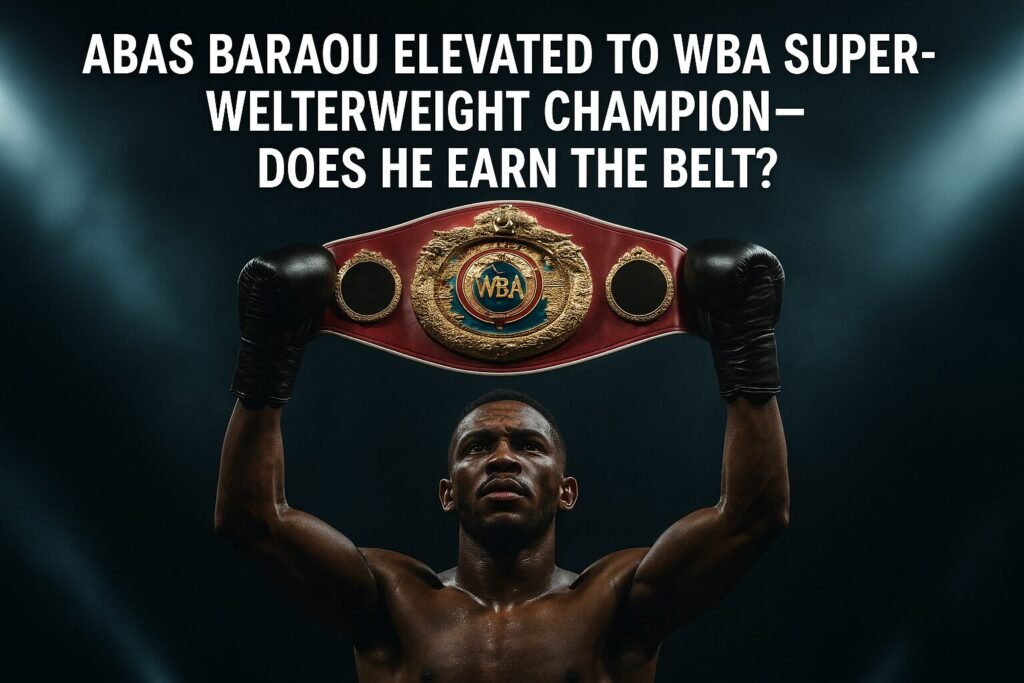When Terence Crawford chose to vacate his WBA super-welterweight title in pursuit of bigger names like Canelo Álvarez, the sanctioning body had a ready-made solution. Abass Baraou, who held the interim strap, was promptly upgraded to full champion status. On paper, it’s a career-defining moment for the German fighter. But in practice, questions remain. Has Baraou truly earned the right to call himself a world champion, or is this yet another example of how muddled the title landscape has become?
The Rise of a “Champion”
Interim titles have always been controversial. They exist to keep divisions moving when a champion is inactive, but all too often they end up as shortcuts to full honours. Baraou’s situation is a textbook case. One day, he’s interim champion; the next, he’s suddenly the man at the top of the division.
It’s hard not to ignore the broader issue of title inflation in boxing. Belts are handed out so frequently that the meaning of “world champion” has been stretched thin. I’ve written before about the problem with interim titles and how the sport risks undermining itself with endless variations of champions. The truth is, until a fighter defends their newly awarded belt against credible opposition, they’re rarely seen as the genuine article.
Baraou’s Credentials
To be clear, Abass Baraou is no fraud. A decorated amateur and a professional with solid fundamentals, he has shown flashes of the quality required to compete at the top of the super-welterweight division. His jab is crisp, his footwork tidy, and he has already built a respectable record against European-level opposition.
But here lies the problem. Respectable isn’t the same as world-class. The super-welterweight scene is brimming with proven names — Tim Tszyu, Jermell Charlo, and Erickson Lubin, to name just a few. Compared with them, Baraou still feels untested. Until he takes that step up, the question mark over his legitimacy will linger.
The Paper Champion Label
This is the risk every interim holder faces when they are upgraded. Without a statement win, they risk being dismissed as a “paper champion.” Fans are quick to spot the difference between someone who won a vacant or elevated title, and someone who ripped it from a reigning champion in the ring.
Boxing has reached a point where belts are almost too easy to acquire. As I’ve argued before in Boxing Belt Overload, the constant dilution of titles leaves fighters in danger of being overshadowed by the system itself. It’s not that Baraou lacks talent; it’s that the path he’s taken to the belt leaves room for doubt.
Should the WBA Have Vacated Instead?
Here’s the uncomfortable truth: the WBA could have avoided this whole debate by simply vacating the title outright. Let Baraou fight for it in the ring, against another top contender, and at least the winner would have the legitimacy of winning a championship bout. Instead, the optics are that Baraou has inherited a belt rather than claimed it.
This is where boxing gets tangled up in its own contradictions. On one hand, we have too many belts already — I’ve said countless times the sport is drowning in them. But on the other hand, elevating fighters without a fight devalues the very thing those belts are meant to represent. It’s lose-lose for credibility.
I hate to say it, but boxing could learn from elsewhere. WWE, while scripted, at least has a title picture that’s far easier for fans to follow. Their United States and Intercontinental championships function as clear secondary belts beneath the world titles. The structure is simple, logical, and fans know exactly where each belt sits. Before anyone in the comments reminds me WWE is staged — I agree — but the point stands.
Or look at the UFC. They don’t hand out belts unless someone wins a fight for them. Interim titles do exist, but they’re rare, and they’re resolved quickly. That’s the kind of clarity boxing desperately lacks.
What Baraou Must Do Next
If Abass Baraou wants to shed that label, he doesn’t have the luxury of treading water. His first defence must be meaningful — not a soft touch, not a voluntary against a fringe contender, but a real fight against one of the division’s best. If he wins, the narrative flips. He’ll no longer be “the man who was handed Crawford’s belt” but “the man who stepped up and proved he belonged.”
Anything less, and the scepticism will only deepen.
Final Thoughts
Abass Baraou has the skills to be more than a transitional champion. But the belt he now wears around his waist is only as legitimate as the opponents he defends it against. Until then, his status will remain contested — a talented fighter elevated by circumstance rather than conquest.
So the question stands: is Abass Baraou champion a title of true merit right now, or one that still needs to be earned? Share your thoughts in the comments, and for more of my takes on the state of modern boxing, head over to CMBoxing.

